MESSAGE TO MANKIND
The authors and supporters of the Constitution of 1787 foresaw that a clear-cut vote against it in the state ratifying conventions would destroy the United States most important experiment in popular government. A particular point of concern was the growing state of New York, whose governor, George Clinton, was a formidable opponent of the proposed charter.
Alexander Hamilton, in an energetic effort to win over his home state, began a series of essays explaining and defending the Constitution. These were published in New York City newspapers under the pseudonym Publius. Hamilton was aided by contributions from two advocates of a new and energetic national government, James Madison and John Jay. The efforts of these three men resulted in The Federalist Papers an authoritative analysis of the young nations Constitution and an enduring classic of political philosophy.
THE FEDERALIST PAPERS
Alexander Hamilton James Madison John Jay
E DITED BY C LINTON R OSSITER
W ITH AN I NTRODUCTION AND N OTES
BY C HARLES R. K ESLER
A SIGNET CLASSIC
SIGNET CLASSIC
Published by New American Library, a division of
Penguin Putnam Inc., 375 Hudson Street,
New York, New York 10014, U.S.A.
Penguin Books Ltd, 80 Strand,
London WC2R 0RL, England
Penguin Books Australia Ltd, 250 Camberwell Road,
Camberwell, Victoria 3124, Australia
Penguin Books Canada Ltd, 10 Alcorn Avenue,
Toronto, Ontario, Canada M4V 3B2
Penguin Books (N.Z.) Ltd, Cnr Rosedale and Airborne Roads, Albany, Auckland 1310, New Zealand
Penguin Books Ltd, Registered Offices:
Harmondsworth, Middlesex, England
Published by Signet Classic, an imprint of New American Library, a division of Penguin Putnam Inc. Previously published in a Mentor edition.
Copyright Penguin Putnam Inc., 1961
Introduction and notes copyright Charles R. Kesler, 1999 All rights reserved
ISBN: 978-1-1012-1290-5

REGISTERED TRADEMARKMARCA REGISTRADA
The Library of Congress has catalogued the Mentor edition of this title as follows: 99-13668.
Without limiting the rights under copyright reserved above, no part of this publication may be reproduced, stored in or introduced into a retrieval system, or transmitted, in any form, or by any means (electronic, mechanical, photocopying, recording, or otherwise), without the prior written permission of both the copyright owner and the above publisher of this book.
The scanning, uploading and distribution of this book via the Internet or via any other means without the permission of the publisher is illegal and punishable by law. Please purchase only authorized electronic editions, and do not participate in or encourage electronic piracy of copyrighted materials. Your support of the authors rights is appreciated.
Contents
Introduction
The Constitution that emerged from the Philadelphia Convention in September 1787 has been called a "bundle of compromises," but at the time it struck many Americans as something more ominous. In its opponents eyes, the proposed Constitution was flawed at best and at worst downright sinister. George Mason, for example, the author of the Virginia Declaration of Rights and one of the most distinguished delegates to the Federal Convention, refused to sign the document because of the unfortunate mistakes he detected in it. "This Government will commence in a moderate Aristocracy," he predicted, and though it was impossible to tell whether "in its Operation" it would produce "a Monarchy, or a corrupt oppressive Aristocracy," it would probably "vibrate some years between the two, and then terminate in the one or the other." Other critics were less charitable. They discerned in the document an "insidious design to deprive us of our liberties." The Constitution, one wrote, was the "most daring attempt to establish a despotic aristocracy among freemen, that the world has ever witnessed." (For all notes in the Introduction, see Endnotes [pp. xxxiiixxxv].)
The Constitutions friends were not satisfied with the document, either. "No mans ideas were more remote from the plan than [mine] were known to be," Alexander Hamilton announced to the Convention on the day he signed the Constitution. James Madison confided to Thomas Jefferson "that the plan should it be adopted will neither effectually answer its national object nor prevent the local mischiefs which every where excite disgust against the state governments." Its friends, in short, vii feared that the Conventions compromises had resulted in a plan of government too weak and incoherent to save American republicanism; its opponents suspected that the Constitution, whether by accident or by design, was a formidable engine that would subvert republicanism in favor of some form of aristocratic domination.
The great accomplishment of The Federalist (popularly known as The Federalist Papers ) was to show that the Constitution was both coherent and republican. Suppressing their private doubts and disappointments, Hamilton and Madison, joined by John Jay, undertook the series of essays in order to expound the merits of the new Constitution and to answer the objections to it that had already begun to appear in newspaper columns in New York and across the United States. More than any other speech or writing in defense of the new plan of government, The Federalist showed that the Constitution contained an inherent constitutionalism , which gave a purpose to the whole document and to each of its parts. To put it differently, The Federalist articulated the overall integrity of the Constitution, showing how it fit the requirements of republican government as a whole. Without denying the plans origin in political give-and-take, The Federalist thus interpreted the Federal Convention as having been a forum not for (at least not mostly for) self-interested bargaining, but for public-spirited deliberation. The product of those deliberations was a "fundamental law," sufficiently rational and coherent to be regarded almost as the product of a single wise mind or legislator.
The U.S. Constitution, unlike the laws of many ancient cities, was not of course the work of one wise lawgiver, a point that The Federalist emphasizes. Moreover, the Constitution contained compromises, obscurities, imperfections: "I never expect to see a perfect work from imperfect man," the final Federalist paper admitted. But the obscurities and imperfections were turned to account as additional reasons why this law needed the elaboration, explanation, and defense of a single commentator, whose commentary soon became accepted as authoritative and so helped to fix the meaning of the Constitution itself. This commentator was "Publius," the pen name chosen by the then-anonymous authors of The Federalist. By drawing out the reasoning latent in the text and completing it with his reasoning, Publius presented the Constitution as an achievement in good governmenta plan worthy not only of momentary applause but of the rational and enduring consent of an enlightened public.
In fact, Publius quickly became accepted as the best guide not only to how the framers had understood the Constitution when they wrote it, but also to how the people of the United States had understood the Constitution when they ratified it. Thomas Jefferson described The Federalist in 1788 as "the best commentary on the principles of government, which ever was written." In 1825, he recommended it as an authority on the "distinctive principles" of the governments of Virginia and the United States, second in importance only to the Declaration of Independence. Writing then almost forty years after its first publication, Jefferson endorsed The Federalist as "an authority to which appeal is habitually made by all, and rarely declined or denied by any as evidence of the general opinion of those who framed, and of those who accepted the Constitution of the United States, on questions as to its genuine meaning." In this case, in fact, he recommended The Federalist as a guide to the Constitution without bothering to recommend the Constitution itself! Little wonder, then, that the political scientist Clinton Rossiter, writing in 1961, acknowledged The Federalist as "the most important work in political science that has ever been written, or is likely ever to be written, in the United States. It is, indeed, the one product of the American mind that is rightly counted among the classics of political theory."

 REGISTERED TRADEMARKMARCA REGISTRADA
REGISTERED TRADEMARKMARCA REGISTRADA
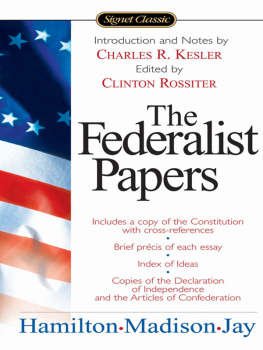
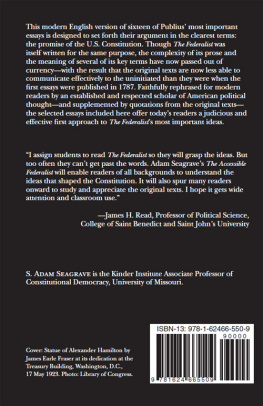
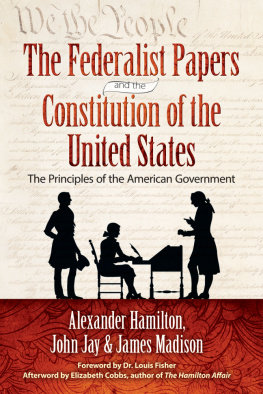
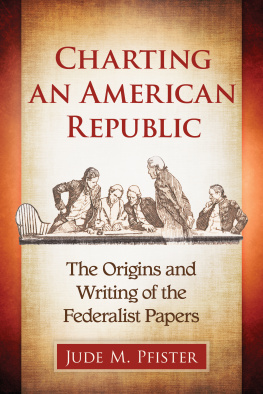

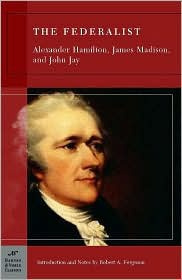
![Jay John - The Federalist : a collection of essays, written in favour of the new Constitution, as agreed upon by the Federal Convention, September 17, 1787. : In two volumes. Vol. I[-II.]](/uploads/posts/book/76130/thumbs/jay-john-the-federalist-a-collection-of-essays.jpg)

